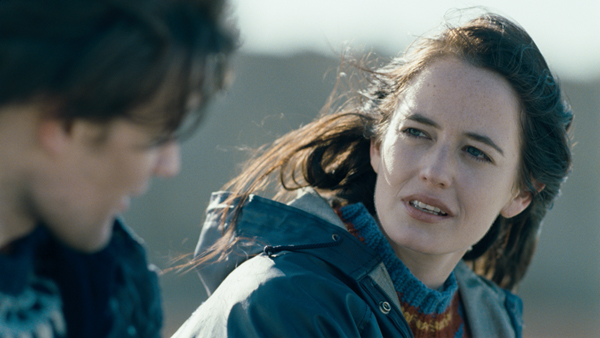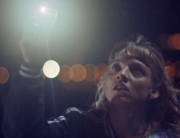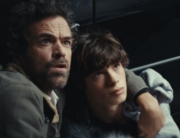
Matt Smith and Eva Green (Olive Films)
If there are two things I like in movies it’s self-assurance and shocks that are delivered coolly, almost matter-of-factly. So not only was I prepared to like Benedek Fliegauf’s 2010 film Womb, but, during its early stages, I actually did so quite a bit. But then something happened during the second act, and those two traits that I usually appreciate so much started to have the opposite effect: the air of confidence, combined with the film’s “provocative” premise, gave it the feeling of being entirely too pleased with its own audaciousness.
If you’re unfamiliar with that premise, it concerns cloning and, um, incest—and yes, Womb has achieved, even before its theatrical releases in the U.S., something of a notorious reputation. Ah, but is it really incest if you merely provide a womb (hence the title) as a means to bear a carbon copy of a lost love? If that question strikes you as probing, fearless, anticipatory of moral questions, and so on, then by all means check out Womb. It certainly explores that terrain, albeit in an indirect, often elliptical way.
Admittedly that “cloning-plus-incest” summation hardly does justice to the plot, which at once covers so much more ground than that yet never really seems to move forward. The opening, featuring the seaside friendship struck up by a boy, Thomas, and a girl, Rebecca, is the most inviting section of the film, with Fliegauf creating an intriguing, fable-like atmosphere. Later, as adults, Thomas and Rebecca meet again, and a disjointed sense of narrative time is already evident as we’re meant to accept that the characters’ new incarnations, played by Matt Smith and Eva Green, are both in their early to mid-twenties. After the two are separated again, Rebecca then makes the fateful decision to raise a child who will basically grow up to be Smith, with the notion that now they’ll never be apart. Apparently the laws in this quasi-futuristic story setting are fairly lax in regard to human cloning, but even this is something one accepts, viewing it as part of a magic realist approach in which we’re not supposed to question the messy details.
Soon, however, the film drifts so far in this direction of unmoored, even abstract, narrative that the audience begins to stop caring about the characters—which is particularly unfortunate because Womb works far better when it’s character-driven than when it attempts to be a drama of ideas. There are details, most of them character related, but they are left dangling, like the frayed ends of other subplots that don’t quite make it into the movie. As a consequence, we have Rose (Natalia Tena), who’s both Smith’s lover and some kind of nurse or technician at the medical facility where the cloning is done… but nothing much happens with her. There are also a few anti-clone bigots who wander into the plot and do things, like not invite the boy clone to their kids’ parties. It’s a theme that might make for a strong movie by itself, but here it’s just one more element that feels too facile and too opportunistic since it doesn’t really impact the central storyline. Similarly, Smith’s parents crop up from time to time, but just when you think that they’ll contribute to a major dramatic payoff, the script short shrifts them as well.
So although Womb’s ambitious structure comprises four or five acts, they don’t cohere. As a result, the film feels overstuffed and undernourished at the same time—as if we’re expected to make a meal out of finger foods. Instead of strengthening the core narrative, Fliegauf seems to double-down on the sexual tension between the main characters, with all the other potentially interesting bits merely serving as handmaidens to it. In a sense, then, Womb’s self-conscious edginess, isolated setting, relatively small cast, and allegiance to a dark brand of romance make it recall a Kim Ki-duk film… but one that feels barely fleshed out beyond its logline.
On the positive side, Smith gives it his all, and is exciting to watch in several scenes. Green, until recently perhaps the most underused star of the past decade, likewise does a solid job, but Fliegauf directs her as if a piercing gaze alone could convey everything one needs to know about Rebecca. It’s an effective strategy the first time it’s used, but as it’s repeated and her silence and inscrutability are slowly mirrored by the film itself, things become tiresome very quickly. I’ve no question that Fliegauf is a talented director, and I admire how both leads decided to take on a risky project like this, but there’s a miscalculation here about the sort of thing that gives an audience pleasure—even icky pleasures, even guilty ones.






Leave A Comment